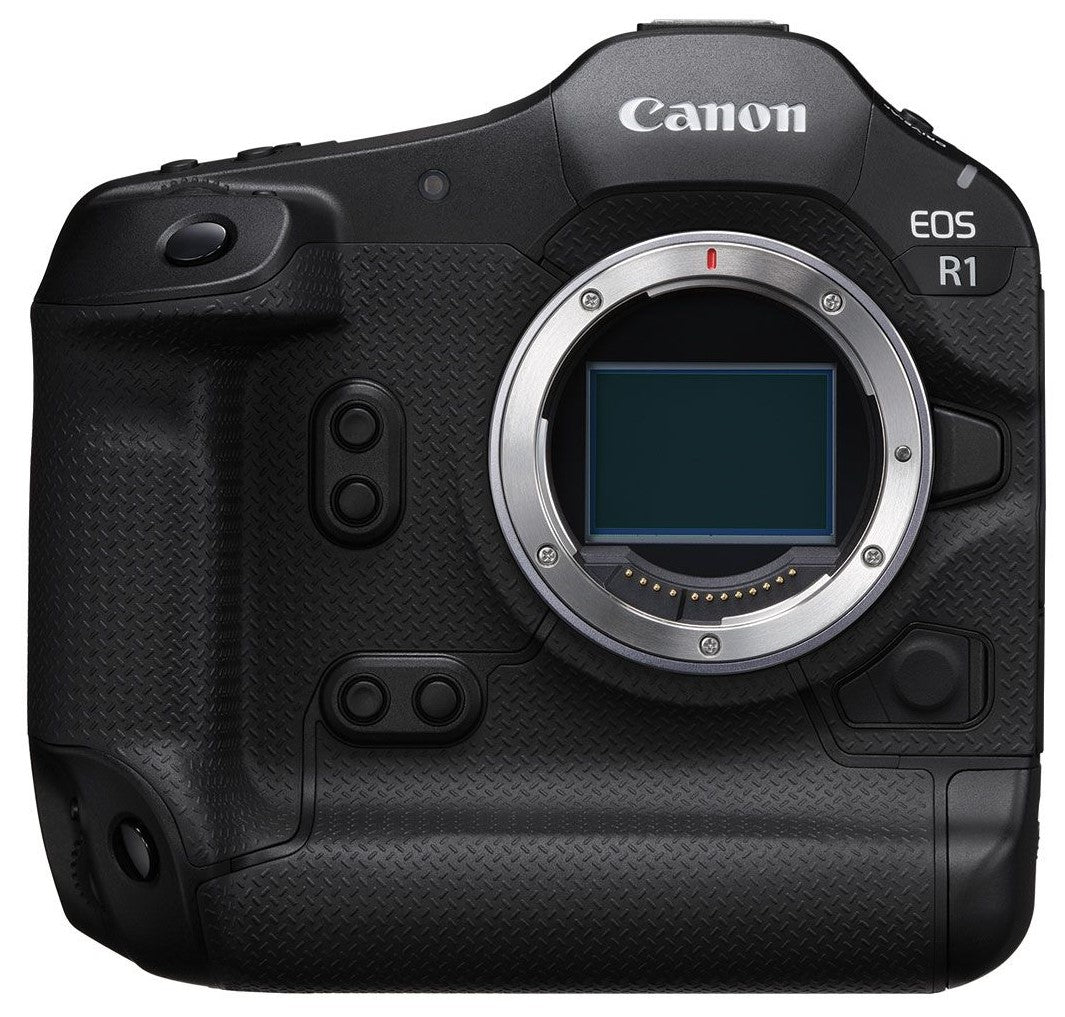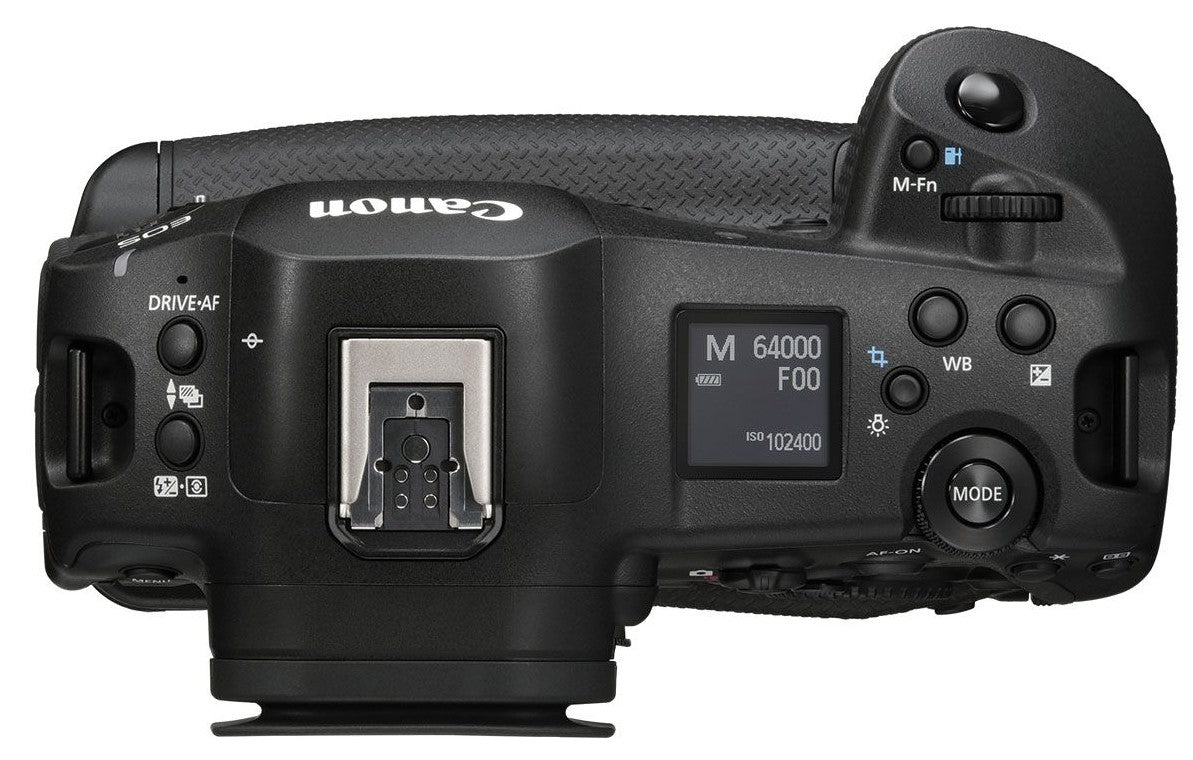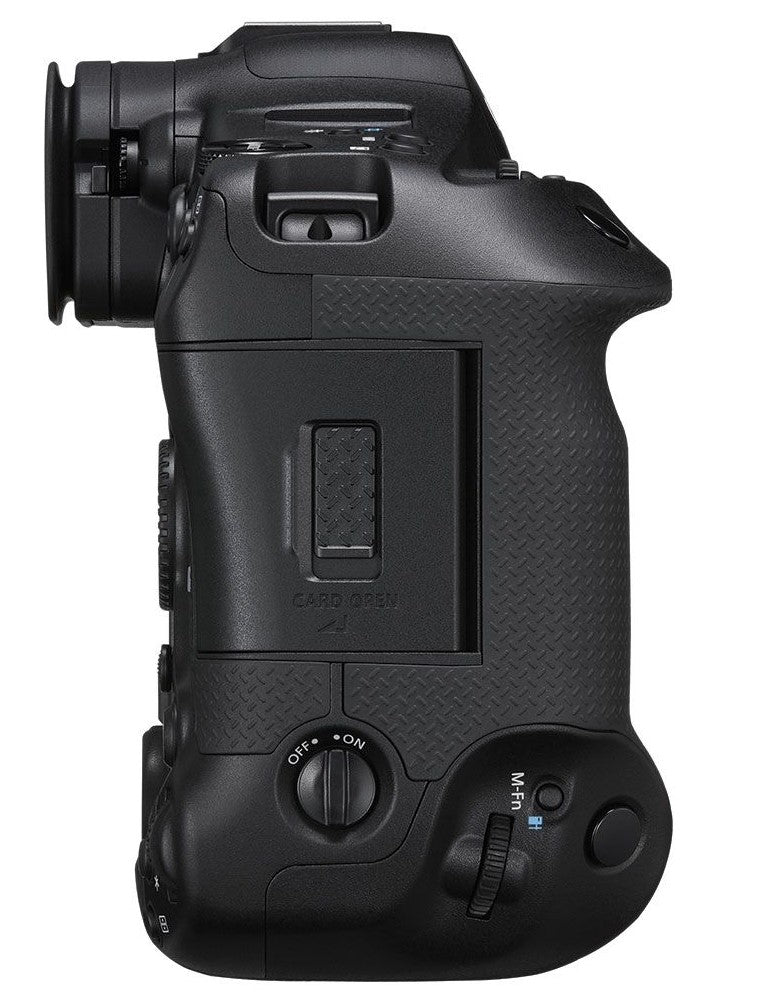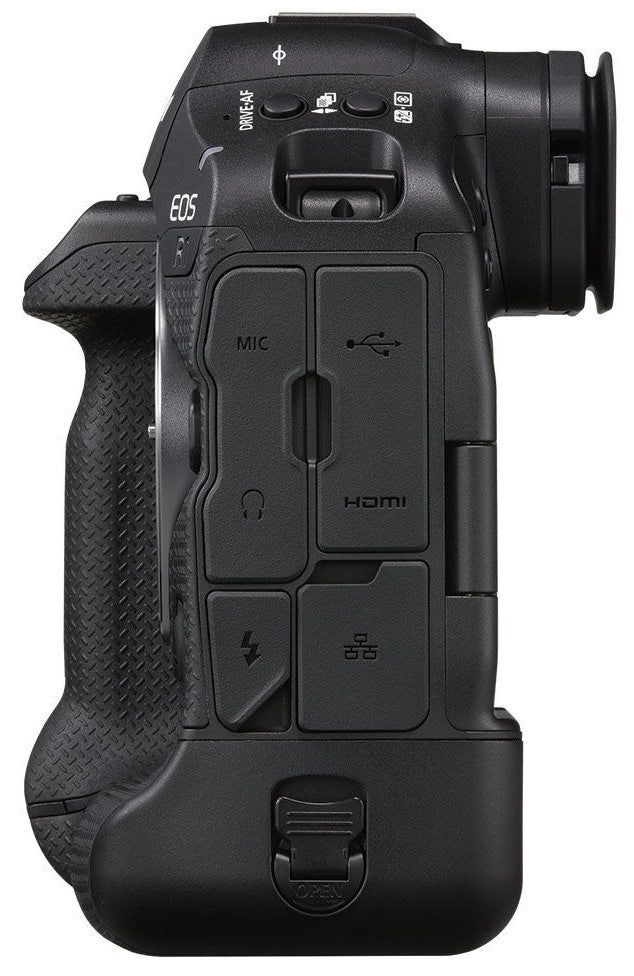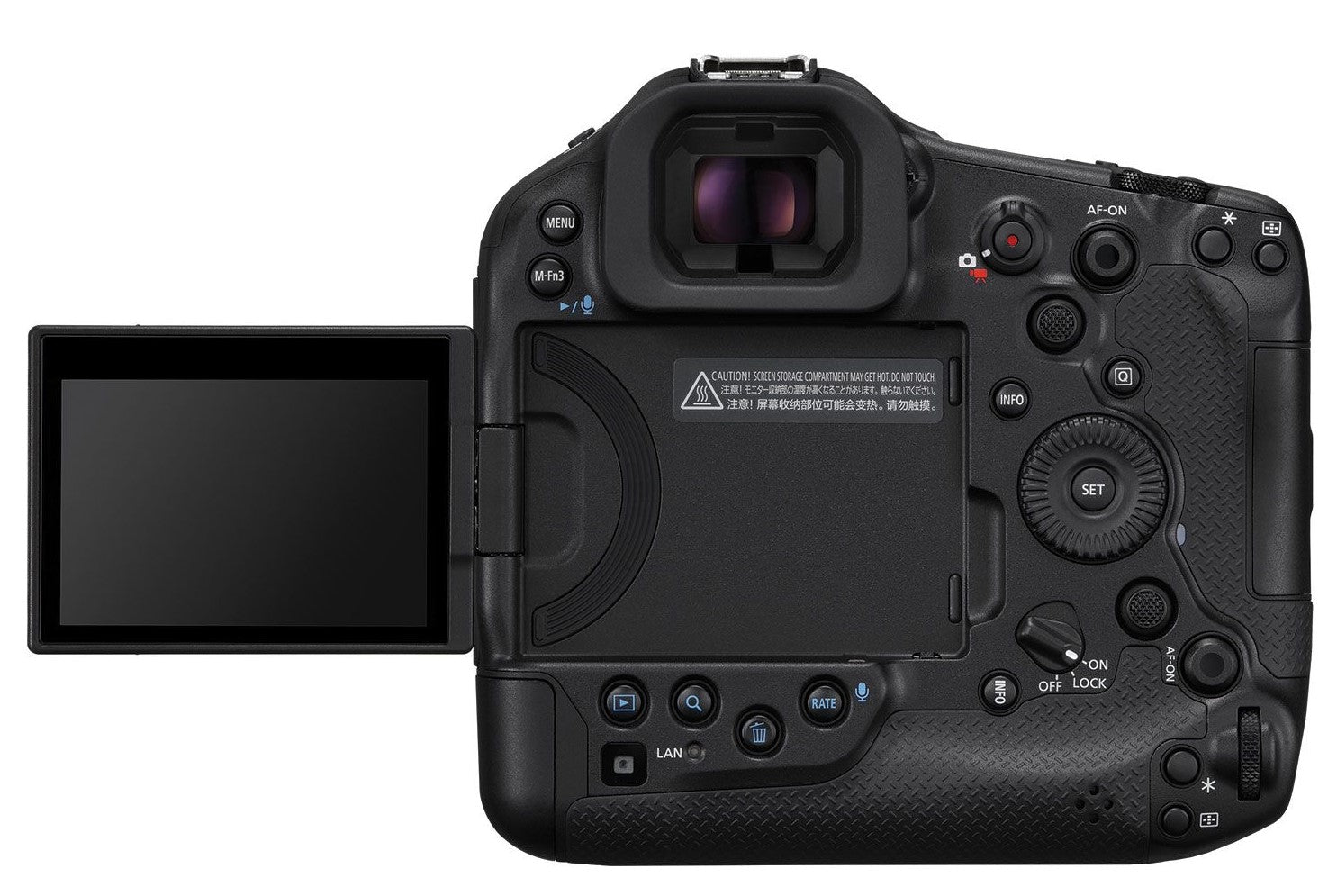Description
The Canon EOS R1 is our top-of-the-line full-frame professional camera that is a powerhouse for professionals working in fast action situations, carrying on the legacy of the Canon EOS-1D X Mark III digital SLR camera. The 1-series has a long tradition of providing excellent AF performance, speed, durability and reliability, all areas the EOS R1 excels in, but there is so much more, new processing, video features, and new networking features really makes this 1-series camera the ONE everyone has been waiting for.
The sensor design on this camara is all new, and all Canon. this new 24.2MP back-illuminated stacked CMOS sensor is the heart of the EOS R1. Balancing the needs of speed and quality, this sensor provides enough pixels for a two-page magazine spread (without enlargement of the file), while also providing incredibly fast sensor read-out speeds, and enhancing low-light performance. The sensor read-out is so fast that it has virtually eliminated Electronic shutter rolling shutter distortion issues. Thanks to this new sensor, and the addition of the new DIGIC Accelerator front-engine processor, the R1 is capable of capturing up to 40 fps of RAW, JPEG, or HEIF (HDR-PQ) images using Electronic Shutter. The DIGIC Accelerator chip also has a useful In-camera Upscaling feature that uses deep learning to double the horizontal and vertical size of a JPEG on your card (leaving the original image alone) in about 10 seconds. That means you can upscale a 24MP image to 96MP right in the camera. The EOS R1 maintains a full Mechanical shutter, and First Curtain Electronic shutter, both capable of continuous shooting at up to 12 fps. Additionally, all continuous shooting speeds with electronic shutter can be user-customized to meet your continuous shooting needs.
DIGIC Accelerator
Autofocus is on a whole new level with the EOS R1. New subject tracking allows you to maintain focus on a moving subject even when they are obscured briefly while shooting. And, for even faster positioning of your active AF Area, the R1 adds Canon’s Eye Control AF — even more advanced than the Eye Control in the EOS R3 camera. Once you calibrate the viewfinder to your eye, just look where you want to focus, and the AF Area will move there when you press the AF activation button. This new system is even robust enough for many users to work when the photographer is wearing glasses. The R1 features another first for Canon — the CMOS sensor itself now has cross-type Dual Pixel AF on its imaging sensor, to give a more positive focus response to scenes that have a lot of linear detail like window blinds or planks on a boardwalk.
Action priority
According to movement and other factors, it simplifies finding and keeping an active AF Area upon a subject about to perform a critical action, and it can really help getting great sports pictures! This feature works with three sports at the moment, soccer, volleyball, and basketball. With Action priority the camera can recognize and track specific people, and takes into account ball tracking, movement evaluation, and even multiple subjects in a scene at the same time, to help ensure you get the action shot you want when everything is moving so fast in front of your eyes. This Action Priority mode takes on even more power when you pair it with pre-continuous shooting. When enabled, pressing the shutter button halfway will start the pre-recording process, when you fully depress the shutter, the previous 1/2 -second of images will be written to the memory card (so up to 20 if the R1 is shooting at 40 fps), and will continue capturing images until you release the shutter button.
Our best EVF
The new Electronic viewfinder is now Canon’s best ever, featuring a 9.44 million dot resolution in an OLED display, a 0.9x magnification for a large view, and its maximum brightness is the highest yet in an EOS R-Series camera. Additionally, some of the EVF optics inside the body are sealed in an airtight structure, making it less likely that the viewfinder will fog up.
If you are coming from a DSLR , using this EVF will feel very natural to you, but you will have access to much more information than you ever could have had in a DSLR. And, low-light viewing is a big improvement over previous optical viewfinders, as well.
Reliability
Like every 1-series camera before it, the EOS R1 features robust dust- and weather-resistance and the camera also features a magnesium alloy exterior body. Reliability means more than just weather resistance at Canon, every component of the R1 is put through more rigorous testing than any of our other models — from button presses, to dial turns, this camera is ready for real life photo and video capture and all of what that entails.
Dual Card Slots for CFexpress** Type B
Dual slots for CFexpress cards give you the speed and storage you need for demanding projects. This also allows for cool abilities, like the ability to record smaller-sized proxy movies to slot 2 while simultaneously capturing high-res footage on the main card in slot 1. Using the Dual Shooting (still & movie) setting, the dual slots also allow you to capture 17MP JPEG still images to slot 2, while recording 30 fps Full HD video on the main card with no interruption to the video.
**The camera can accept CFexpress cards over 2TB in capacity. With these cards, the camera can write to the first 2TB (only) of total card capacity.
Video where you need it
The EOS R1 also provides versatile cinema integration, with a range of high-performance video features, including 6K, RAW recording in-camera at up to 60 frames per second, 4K MP4 recording up to 120 frames per second (with audio), and 2K or Full HD recording to 240 frames per second. The R1 even has a built-in tally lamp, and is capable of recording 4-channel audio.
Improved Image Stabilization*1*2
The EOS R1 has three stabilization methods (in-body, optical, and independently-activated movie digital IS) for spectacular stabilization performance, especially when recording video, where it can help suppress blur in the peripheral area. IS (Coordinated Control) can deliver up to 8.5 stops at center and 7.5 stops at the periphery.*3*4 The in-body image stabilization is even more powerful when paired with a compatible RF or RF-S lens with image stabilization for coordinated IS, where the lens and camera work together to maximize the stabilization effect.
*1: For compatible lenses, refer to Supplemental Information for EOS R1 on the website cam.start.canon.
*2 When using Movie digital IS, the field of view is reduced.
*3: Based on the CIPA 2024 standard. Yaw/Pitch/Roll image stabilization performance, when using RF24-105mm F2.8 L IS USM Z (f=105mm)
*4: For supported lenses, please see "Supplemental Information" for EOS R1 on the website "cam.start.canon".
- Powerful Auto-focus upgrades such as the “Cross-type AF” at the imaging sensor, a first for Canon.
- New Canon-designed 24.2MP full-frame back-illuminated stacked CMOS sensor (with Dual Pixel AF).
- Built-in neural upscaling feature can double horizontal and vertical image size to create a 96MP JPEG in about 10 seconds.
- Pre-continuous shooting to capture the previous 1/2-second of images prior to a full shutter release.
- New DIGIC Accelerator works in tandem with the DIGIC X Image Processor to handle tasks like eye control, metering, and much more for better and faster overall performance.
- Fast sensor read-out speeds virtually eliminate rolling shutter concerns and allow for up to 40 fps electronic shutter performance.
- Record RAW videos at 6K and MP4 videos in 4K-D, 4K-U, 2K-D, and Full HD formats.
- Featuring the best Canon OLED EVF we have ever released with 9.44 million dots, and 0.9x magnification.
- Capture video and stills simultaneously with no interruption.
- Action Priority mode uses data to interpret the scene and predict the main subject to lock focus on it in action scenarios.
- People Priority Shooting for registering up to 10 people the camera can recognize and prioritze focus of.
- Has the same dust- and weather-resitance capabilities that have been synonomous with the EOS-1 line for decades.
The sensor design on this camara is all new, and all Canon. this new 24.2MP back-illuminated stacked CMOS sensor is the heart of the EOS R1. Balancing the needs of speed and quality, this sensor provides enough pixels for a two-page magazine spread (without enlargement of the file), while also providing incredibly fast sensor read-out speeds, and enhancing low-light performance. The sensor read-out is so fast that it has virtually eliminated Electronic shutter rolling shutter distortion issues. Thanks to this new sensor, and the addition of the new DIGIC Accelerator front-engine processor, the R1 is capable of capturing up to 40 fps of RAW, JPEG, or HEIF (HDR-PQ) images using Electronic Shutter. The DIGIC Accelerator chip also has a useful In-camera Upscaling feature that uses deep learning to double the horizontal and vertical size of a JPEG on your card (leaving the original image alone) in about 10 seconds. That means you can upscale a 24MP image to 96MP right in the camera. The EOS R1 maintains a full Mechanical shutter, and First Curtain Electronic shutter, both capable of continuous shooting at up to 12 fps. Additionally, all continuous shooting speeds with electronic shutter can be user-customized to meet your continuous shooting needs.
DIGIC Accelerator
Autofocus is on a whole new level with the EOS R1. New subject tracking allows you to maintain focus on a moving subject even when they are obscured briefly while shooting. And, for even faster positioning of your active AF Area, the R1 adds Canon’s Eye Control AF — even more advanced than the Eye Control in the EOS R3 camera. Once you calibrate the viewfinder to your eye, just look where you want to focus, and the AF Area will move there when you press the AF activation button. This new system is even robust enough for many users to work when the photographer is wearing glasses. The R1 features another first for Canon — the CMOS sensor itself now has cross-type Dual Pixel AF on its imaging sensor, to give a more positive focus response to scenes that have a lot of linear detail like window blinds or planks on a boardwalk.
Action priority
According to movement and other factors, it simplifies finding and keeping an active AF Area upon a subject about to perform a critical action, and it can really help getting great sports pictures! This feature works with three sports at the moment, soccer, volleyball, and basketball. With Action priority the camera can recognize and track specific people, and takes into account ball tracking, movement evaluation, and even multiple subjects in a scene at the same time, to help ensure you get the action shot you want when everything is moving so fast in front of your eyes. This Action Priority mode takes on even more power when you pair it with pre-continuous shooting. When enabled, pressing the shutter button halfway will start the pre-recording process, when you fully depress the shutter, the previous 1/2 -second of images will be written to the memory card (so up to 20 if the R1 is shooting at 40 fps), and will continue capturing images until you release the shutter button.
Our best EVF
The new Electronic viewfinder is now Canon’s best ever, featuring a 9.44 million dot resolution in an OLED display, a 0.9x magnification for a large view, and its maximum brightness is the highest yet in an EOS R-Series camera. Additionally, some of the EVF optics inside the body are sealed in an airtight structure, making it less likely that the viewfinder will fog up.
If you are coming from a DSLR , using this EVF will feel very natural to you, but you will have access to much more information than you ever could have had in a DSLR. And, low-light viewing is a big improvement over previous optical viewfinders, as well.
Reliability
Like every 1-series camera before it, the EOS R1 features robust dust- and weather-resistance and the camera also features a magnesium alloy exterior body. Reliability means more than just weather resistance at Canon, every component of the R1 is put through more rigorous testing than any of our other models — from button presses, to dial turns, this camera is ready for real life photo and video capture and all of what that entails.
Dual Card Slots for CFexpress** Type B
Dual slots for CFexpress cards give you the speed and storage you need for demanding projects. This also allows for cool abilities, like the ability to record smaller-sized proxy movies to slot 2 while simultaneously capturing high-res footage on the main card in slot 1. Using the Dual Shooting (still & movie) setting, the dual slots also allow you to capture 17MP JPEG still images to slot 2, while recording 30 fps Full HD video on the main card with no interruption to the video.
**The camera can accept CFexpress cards over 2TB in capacity. With these cards, the camera can write to the first 2TB (only) of total card capacity.
Video where you need it
The EOS R1 also provides versatile cinema integration, with a range of high-performance video features, including 6K, RAW recording in-camera at up to 60 frames per second, 4K MP4 recording up to 120 frames per second (with audio), and 2K or Full HD recording to 240 frames per second. The R1 even has a built-in tally lamp, and is capable of recording 4-channel audio.
Improved Image Stabilization*1*2
The EOS R1 has three stabilization methods (in-body, optical, and independently-activated movie digital IS) for spectacular stabilization performance, especially when recording video, where it can help suppress blur in the peripheral area. IS (Coordinated Control) can deliver up to 8.5 stops at center and 7.5 stops at the periphery.*3*4 The in-body image stabilization is even more powerful when paired with a compatible RF or RF-S lens with image stabilization for coordinated IS, where the lens and camera work together to maximize the stabilization effect.
*1: For compatible lenses, refer to Supplemental Information for EOS R1 on the website cam.start.canon.
*2 When using Movie digital IS, the field of view is reduced.
*3: Based on the CIPA 2024 standard. Yaw/Pitch/Roll image stabilization performance, when using RF24-105mm F2.8 L IS USM Z (f=105mm)
*4: For supported lenses, please see "Supplemental Information" for EOS R1 on the website "cam.start.canon".

